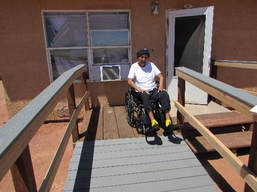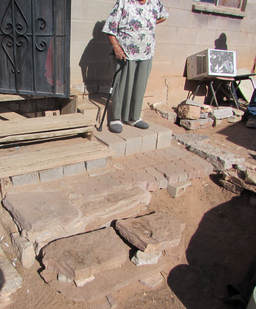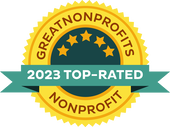 Many of the homes we visit through our home weatherization and Native Home Resource Network programs are those of elders. Red Feather has chosen to focus on elders because they are more susceptible to the negative health impacts of housing disrepair than other age groups and have more difficulty maintaining their homes. In addition to needing to maintain homes, Seniors almost always need additional home modifications like accessibility ramps, widening doorways, installing grab bars in bathrooms, etc. Preventing falls is of particular importance, since they are the leading cause of injury-related visits to the emergency room in the U.S. and the primary cause of accidental deaths in people over 65. At least one third of all falls come from tripping over objects, poor lighting, or lack of grab bars. Fall risk is further complicated by other health problems that, sadly, have much higher rates in native communities; such as arthritis, obesity, diabetes and respiratory diseases.  Historically, native elders have been revered in their communities for their life experiences and knowledge of traditional practices and lifeways. And while this principle still holds true, it has been complicated by many of the unfortunate side effects of historical trauma, federal cultural eradication policies, poverty, and geographic isolation. All of this has left many elders lacking the support needed to successfully age in place. The desire to age in place is not a phenomenon isolated to tribal lands. According to AARP, nearly 90 percent of seniors nationally want to stay in their own homes as they age. Very few prefer moving to a long-term care facility where they lose some of their personal freedoms and comforts. For many Native Americans , the only assisted living facilities are located hundreds of miles away from their homeland; which often makes those who have a deep spiritual connection to both their home and land willing to endure significant hardships to stay there. In 2017 we received a grant from Kendal Charitable Funds that enabled us to work with our partner at Northern Arizona University, Dr. Lisa Hardy, to develop a training module that increases the capacity of Hopi agencies and individuals to perform home health and safety assessments for elders and instruct home occupants how to remedy basic problems. This involved producing classroom curriculum, developing and distributing Helping Tribal Elders Age in Place Workbooks and Healthy Home instructional flashcards, and distributing DIY Aging In Place Kits. Additionally, we provided a two-day Aging In Place Home Health Assessment training to 12 individuals representing Hopi tribal government and Village Administrative offices and some regular homeowners from the Hopi community. In total, seven villages participated in the delivery of the program, conducting a total of 22 home assessments and delivering 24 aging in place kits focused on preventing falls and improving air quality. At the completion of this work, we received an additional round of funding from Kendal Charitable Funds to continue building on our current work with community partners, performing more home assessments and delivering more DIY Aging In Place Kits. Comments are closed.
|
Archives
June 2023
Categories
All
|
|
Change your mind at any time by clicking 'unsubscribe' in any email you receive or by contacting us at [email protected]. We will treat your information with respect. For more information about our privacy practices please see our privacy policy. By clicking above, you agree that we may process your information in accordance with these terms.
In compliance with all GDPR requirements- you can request any data you’ve shared with Red Feather to be permanently deleted from our records by contacting us at [email protected]. |
WORKING WITH HOPI AND DINÉ
COMMUNITIES FOR HEALTHIER AND SAFER HOMES.
LAND ACKNOWLEDGEMENT: The Red Feather program office sits in an area that is sacred to over 14 local tribes, including the Diné, Hopi, Havasupai, Hualapai, Zuni, Pueblo, and Kaibab-Paiute peoples. Some of these nations are represented among the Red Feather staff, and some not. We humbly acknowledge this area’s Indigenous nations, original stewards and Native descendants who will forever know this place as home. We share a responsibility to recognize and acknowledge the people, cultures, and histories that make up our community. *Adapted from the Flagstaff City Council land acknowledgement developed by the Indigenous Commission

If you have a disability that limits your ability to access our facilities, please contact us so we can arrange for an alternative meeting location. See our ADA access plan here.
This institution is an equal opportunity provider. |


 RSS Feed
RSS Feed

